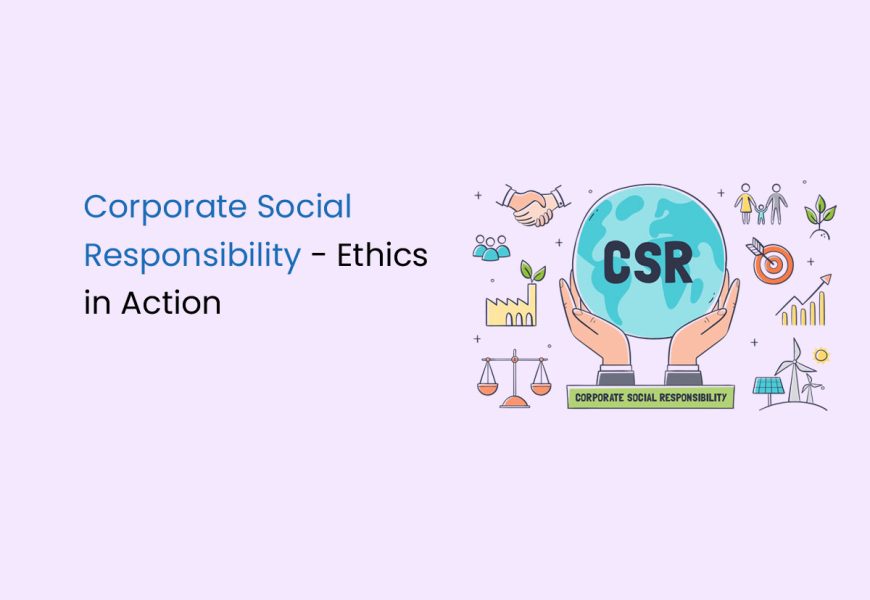Corporate Social Responsibility is a crucial part of business, focusing on ethical practices, sustainability, and benefiting society and the environment. It’s no longer just an afterthought but a core strategy for companies. This shift is due to changing consumer demands, regulations, and the understanding that business success is tied to societal well-being.
In this blog, we’ll delve into the importance of CSR, its types, benefits and some examples.
What is Corporate Social Responsibility?
Corporate Social Responsibility revolves around the idea that businesses have obligations beyond maximising profits for shareholders. They must consider the broader impact of their actions on various stakeholders, including employees, customers, communities, and the environment. CSR encompasses multiple initiatives and practices to integrate social, environmental, and ethical considerations into business operations and decision-making processes.
Through CSR, companies prioritise decisions considering not only financial gain but also the impact on communities and the wider world. CSR isn’t just about meeting legal requirements; it’s about voluntarily embracing ethical, sustainable, and responsible business practices. Companies aim to benefit consumers, shareholders, employees, and society.
For a company to embody social responsibility, it must first be accountable to itself and its shareholders. Typically, companies that implement CSR programs have reached a level of growth where they can actively contribute to society. Consequently, CSR is a strategy adopted by larger corporations. As these corporations gain visibility and success, they also shoulder a greater responsibility to establish ethical standards within their industry and influence their peers and competitors to follow suit.
Importance of Corporate Social Responsibility
While a company’s business model typically revolves around financial objectives, Corporate Social Responsibility (CSR) programs prompt business leaders to broaden their perspective. When making decisions, they’re encouraged to factor in corporate citizenship and the broader societal impact. CSR ensures that companies operate ethically, prioritise safety, and strive for positive outcomes. Companies aim to minimise their environmental footprint through CSR initiatives, address societal challenges, and align their brand identity with their values.
Key components of Corporate Social Responsibility
The components of CSR are as follows:
- Environmental Sustainability: Businesses are expected to reduce their ecological impact by adopting sustainable practices, minimising waste, conserving resources, and mitigating the effects of climate change. This involves participating in initiatives such as carbon neutrality, renewable energy adoption, waste reduction, and eco-friendly product development.
- Social Responsibility: Beyond economic considerations, businesses are responsible for addressing social issues and contributing to the well-being of communities. It can take various forms, like philanthropy, volunteer programs, community development projects, and initiatives to promote workforce diversity, equity, and inclusion.
- Ethical Governance: Upholding ethical standards and principles is the basis of CSR. It involves maintaining transparency, integrity, accountability in business operations and adherence to legal and regulatory requirements. Ethical governance also involves responsible supply chain management, fair labour practices, and avoiding practices that harm society or violate human rights.
Types of Corporate Social Responsibility
The four main types of CSR are as follows:
Environmental Responsibility
Environmental responsibility is a core component of CSR, focusing on protecting natural resources and minimising any contributions to climate change. Companies can uphold this responsibility by implementing various practices:
- Reducing Pollution and Waste: Minimising pollution, waste, natural resource consumption, and emissions during manufacturing processes.
- Promoting Recycling and Reuse: Implementing recycling programs for goods and materials and encouraging customers to adopt reuse practices.
- Offsetting Negative Impacts: Compensating for environmental damage by replenishing natural resources or supporting conservation efforts. For instance, a company that cuts down trees may pledge to plant an equivalent or greater number.
- Conscious Distribution: Choosing distribution methods that minimise emissions and pollution, such as optimising transportation routes or using eco-friendly packaging materials.
- Product Innovation: Developing product lines that align with environmental values, such as offering electric alternatives to gas-powered products.
Ethical Responsibility
Ethical responsibility is crucial in CSR by emphasising fair and ethical behaviour. Companies establish their ethical standards, although external influences, like client demands, may shape these goals. Examples of ethical responsibility include:
- Fair Treatment: Ensuring equitable treatment for all customers regardless of age, race, culture, or sexual orientation.
- Employee Well-being: Providing favourable pay and benefits that exceed minimum requirements and offering fair employment opportunities to individuals irrespective of personal differences.
- Diverse Vendor Selection: Expanding vendor networks to include suppliers from diverse backgrounds, such as different races, genders, veteran statuses, or economic statuses.
- Transparent Communication: Disclosing operational concerns to investors promptly and transparently, going beyond legal obligations to manage relationships with external stakeholders effectively.
Philanthropic Responsibility
Philanthropic responsibility is a key aspect of CSR, focusing on how a company contributes to society. This includes:
- Charitable Donations: Whether a company donates profits to charities or causes it supports.
- Vendor Alignment: Whether a company engages only with suppliers or vendors that share its philanthropic values.
- Employee Support: Whether a company encourages employee philanthropic activities through initiatives like paid time off or matching contributions.
- Community Engagement: Whether a company sponsors fundraising events or actively participates in community initiatives.
Financial Responsibility
Financial responsibility, a core aspect of CSR, supports environmental, ethical, and philanthropic initiatives. This involves investing in:
- Research and Development: Research and development for sustainable products.
- Diverse Recruitment: Recruiting diverse talent for a more inclusive workforce.
- Training Employees: Employee training on DEI, social awareness, or environmental issues.
- Implementation of Better Practices: Implementing processes with higher costs but more significant CSR impact.
- Transparency: Maintaining transparent and timely financial reporting, including external audits.
Benefits of Corporate Social Responsibility
The benefits of CSR are as follows:
Business Benefits
CSR has the following business advantages:
- Brand Recognition: Customers increasingly favour companies that prioritise benefiting their communities over delivering quality products. With growing awareness of a company’s community impact, many consumers prioritise CSR when purchasing. As a company increases its CSR efforts, it will likely gain positive brand recognition.
- Investor Relations: Companies leading in environmental, social, or governance areas enjoy an 11% valuation premium over competitors. Implementing CSR strategies enhances investor perception and company valuation, providing a competitive edge and potential market outperformance.
- Employee Engagement: CSR-related alignment between firms and employees strengthens employee retention. Employees are more likely to remain with a company they believe in, reducing turnover, dissatisfaction, and the cost of hiring new employees.
- Risk Mitigation: Adhering to CSR practices helps companies mitigate risks by avoiding discrimination, environmental harm, or unethical financial practices. Such actions can lead to lawsuits or negative publicity, potentially harming the company financially and reputationally.
Consumer Benefits
CSR initiatives empower consumers to make responsible choices by providing access to products and services aligned with their values while educating them on sustainability and ethical consumption issues. Additionally, these initiatives encourage companies to invest in testing, quality control, and safety measures, prioritising consumer well-being. By doing so, CSR minimises the likelihood of defective or harmful products reaching consumers, enhancing trust and loyalty.
Environmental Benefits
Corporate social responsibility can significantly contribute to the planet’s health by promoting environmental responsibility and sustainable practices. Through CSR initiatives, companies can actively work to reduce greenhouse gas emissions, pursue net-zero emissions goals, and combat climate change. These initiatives also aid in conserving natural resources, minimising pollution, and preserving ecosystems. Furthermore, a strong focus on CSR encourages investment in research and development of eco-friendly products and practices, further advancing environmental sustainability efforts.
Societal Benefits
Corporate social responsibility is vital in supporting local communities and addressing societal challenges such as poverty, inequality, and environmental issues. Companies can contribute to economic growth through CSR initiatives by creating job opportunities. Moreover, they can influence public opinion positively, serving as inspiring examples for others to emulate and creating a ripple effect of positive change. By prioritising ethical behaviour at the corporate level, companies also help reinforce a broader norm of ethical behaviour across society.
Why are Companies adopting Corporate Social Responsibility?
As consumers increasingly seek products and services from socially responsible companies and investors prioritise aligning values, businesses integrate CSR into their operations. This is driven by global expansion and interconnected supply chains, which require compliance with diverse regulatory environments and addressing impacts on communities worldwide. With heightened awareness of environmental, labour, and ethical issues and improved research and communication, CSR has become central to business strategies. Some companies even establish dedicated CSR departments to meet these demands.
Difference between CSR and ESG
Corporate social responsibility refers to a company’s policies and practices that promote sustainability, ethical standards, and social responsibility. On the other hand, Environmental, social, and governance (ESG) measures a company’s impact. Although CSR and ESG reflect a company’s values, CSR focuses more on internal frameworks. At the same time, ESG is often used to show real-world implications.
What Governs Corporate Social Responsibility?
Various local and international laws govern CSR initiatives, including environmental regulations, labour standards, and consumer protection laws. Some efforts adhere to industry-specific standards, such as the Global Reporting Initiative (GRI) for sustainability reporting. Global guidance like the Sustainable Development Goals (SDGs) from the United Nations also encourages sustainable practices.
Many companies engage in voluntary CSR reporting, documenting non-financial metrics to provide transparency on their social and environmental impact. While CSR reporting is typically voluntary, some jurisdictions mandate it for large organisations to enable investors and consumers to assess CSR efforts.
ISO 26000
In 2010, the International Organisation for Standardisation (ISO) introduced ISO 6000, a set of voluntary guidelines to assist companies in implementing corporate social responsibility. Unlike other ISO standards, ISO 26000 offers guidance rather than requirements because CSR is more qualitative than quantitative, and its standards cannot be certified.
ISO 26000 defines social responsibility and assists organisations in translating CSR principles into actionable steps. It applies to organisations of all types, sizes and locations. Developed with contributions from key stakeholders worldwide, ISO 26000 reflects an international consensus on CSR practices.
What does a CSR Team do?
Some companies have dedicated corporate social responsibility teams responsible for planning and implementing social and environmental programs aligned with the company’s values and goals. These teams collaborate with company leadership to develop the overall CSR strategy and engage stakeholders, including employees, customers, investors and community partners. They track progress, report using metrics, address compliance and regulatory issues, and manage internal and external communication about the company’s CSR efforts.
Examples of Corporate Social Responsibility
Some examples of CSR are as follows:
- ITC: ITC has been actively engaged in impactful CSR activities in India for several years. One notable initiative is the establishment of Supplementary Learning Centres, through which they have provided education to approximately 2,52,329 children. Additionally, ITC has supported and empowered around 15,378 female members by establishing 1,183 self-help groups.
- Tata Power: Tata Power has strongly emphasised empowering women through its Self-Help Groups (SHGs) in the Kutch Region of Gujarat. This initiative offers financial assistance and loans to support various needs such as housing, purchasing cattle, capital for businesses, education, marriage, and medical expenses. By providing women with access to financial resources and support, Tata Power’s SHG program aims to enhance their economic independence and overall quality of life.
- Infosys: Infosys, one of the pioneers of CSR, has undertaken various impactful projects. These include initiatives such as restoring water bodies in Karnataka, collaborating with Bangalore Metro Rail Limited to construct metro stations, and supporting sports through the GoSports Foundation. Additionally, it has established a relief fund for Tamil Nadu, Karnataka and Kerala, demonstrating its commitment to social welfare and community development.
- Reliance: Reliance has initiated several impactful programs to improve the lives of the people of the Balangir district. One such program is the life insurance scheme designed to secure the lives of villagers. Additionally, it has launched the ‘Education For All’ initiative to provide access to quality education for all individuals in India. This initiative focuses on protecting the right to education of underprivileged children, girls and differently-abled individuals. Furthermore, Reliance actively contributes to disaster relief funds, demonstrating its commitment to supporting communities in times of crisis.
- Tata Steel: For the past century, Tata Steel has demonstrated an unwavering commitment to Jharkhand’s social development and upliftment. The company’s CSR committee focuses on enhancing the quality of life in its communities. Notably, in 1991, Tata Steel launched ‘Lifeline Express’, a mobile hospital that provides medical services to underserved regions of India. Additionally, Tata Steel has conducted numerous AIDS awareness programs, further contributing to public health initiatives.
- Amul: Over the years, Amul has actively promoted rural health and development through initiatives such as the Tribhuvandas Foundation. Additionally, it has implemented the Swarnjayanti Gram Swarozgar Yojana, a comprehensive self-employment program in the Kheda district. Furthermore, Amul has organised successful tree plantation drives, blood donation camps, and rural sanitation programs, demonstrating their commitment to environmental conservation and public health. Moreover, they provide scholarships through their Amul Scholar schemes, supporting education and empowering individuals in rural areas.
What to Avoid when Creating a Socially Responsible Business Model
The things to avoid when creating a socially responsible business model are as follows:
- Don’t Choose Unrelated Initiatives: Refrain from participating in charitable initiatives that are not aligned with the company’s primary business focus or that violate its ethical standards in any manner. Instead of blindly donating to an unrelated organisation, it is recommended to identify non-profit organisations that the company supports or invest in a project within the community.
- Don’t use CSR as a Marketing Scheme: CSR opportunities should not be used for marketing purposes. Running a corporate responsibility campaign just for quick marketing gains may result in a negative outcome if the business fails to follow through. Instead of a one-time stunt, it is better to adopt socially responsible business practices over time. Embracing long-term social responsibility can positively impact how employees and consumers perceive your company.
- Don’t Wait for the Industry to Catch Up: If sustainable practices not required by law are in consideration, the company shouldn’t wait to adopt them. Early adoption sets the industry bar and refines processes.
Conclusion
Corporate Social Responsibility represents a meaningful transformation in how businesses operate and engage with the world. It is not just a buzzword. By adopting CSR principles and practices, companies can create value for society and drive sustainable growth. As consumer preferences shift towards ethical and sustainable products and services, CSR becomes increasingly integral to business success.
Frequently Asked Questions
Why should a company implement CSR strategies?
Companies view CSR as an integral part of their brand, believing it improves their public image. CSR can also be a vital component of public relations. Founders may also engage in CSR due to their convictions.
What are the benefits of CSR?
CSR initiatives seek to benefit society, nature, and the community. They can also increase employee satisfaction and retention. A company promoting good causes may attract customers who value positive impact beyond business activities.
What are the four types of CSR?
CSR initiatives are divided into four categories: environmental, philanthropic, ethical, and economic responsibility. Environmental initiatives focus on preserving resources, while philanthropic initiatives donate to worthy causes. Ethical responsibility ensures fair business operations, while financial responsibility promotes their support.
Is CSR mandatory?
Under section 135 of the Companies Act 2013, companies must comply with CSR provisions in India by spending at least 2% of their net profit from the previous three years on social initiatives.














